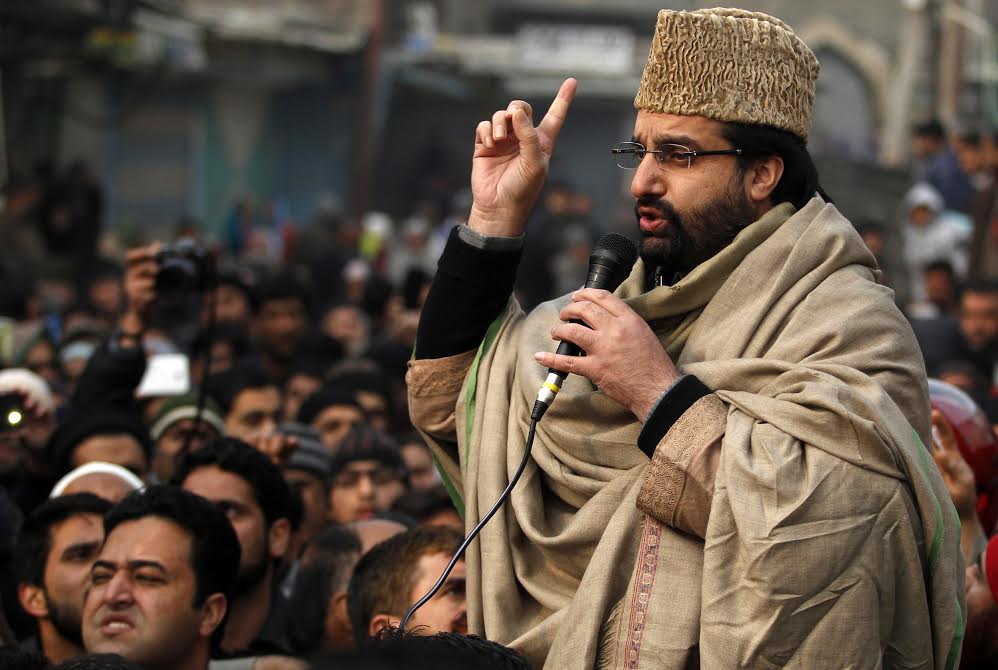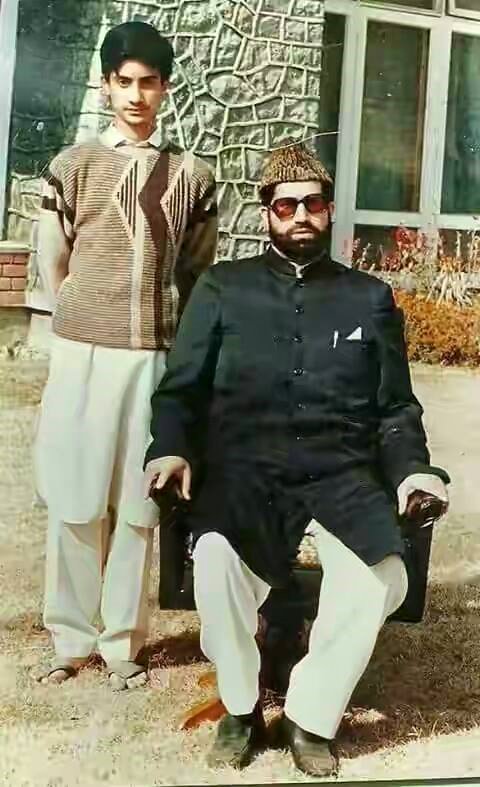In a freewheeling interview Hurriyat (m) chairman Mirwaiz Umar Farooq tells Kashmir Life’s online editor Muhammad Raafi that both Pakistan and joint resistance leadership is ready to talk, but the question is, is India ready?
Kashmir Life (KL): The current situation in Kashmir, especially after Burhan Wani’s killing, has turned world attention back on Kashmir. Isn’t it right time to materialize that attention into a dialogue?
Mirwaiz Umar Farooq (MU): Resistance leadership has always been advocating a speedy resolution of the Kashmir dispute, as the people of Kashmir are the ones bearing the tremendous brunt of the conflict. We have repeatedly said that either giving the people of J&K the right to self determination or a serious and meaningful engagement with the focus on conflict resolution and in keeping with the political aspirations of the people of Kashmir is the way forward. On any given day we are ready for such talks.

KL: The new method of dealing with civilian protestors has added to the anger among Kashmiris. Do you think Indian civil society has turned its back on atrocities in Kashmir?
MU: I will say that better was expected of the Indian civil society in terms of standing up for the human rights of the people of Kashmir and the murder of all democratic norms and principles taking place here. Very few have had the courage to do so.
KL: Has Hurriyat failed to find an alternative to hartals and strikes? Is there an effort among the leadership to look for change in the strategy?
MU: Despite the fact that we are not allowed to meet or deliberate together and our communication channels are frequently blocked and tapped into, the joint leadership and our other colleagues are constantly engaged in finding alternative ways and means to register protests and resist occupation. The problem is that with most of us caged, and all forms and manner of protest and dissent forcibly and ruthlessly disallowed how do we register our resistance and aversion to daily repression around us and protest it?
Both leadership and people are prevented from even visiting the families of those that are mercilessly killed or injured maimed and blinded by the state forces, to share their grief and pain. Suppression keeps touching new low each day. Blocking and banning communication lines, internet services newspapers and social media to suppress news and disallow people to even express their opinion against it, is the norm. In such a scenario what alternatives do we have? I request people to give us their input and suggestion on it. Leadership is open to ideas.
KL: Is joint resistance leadership reluctant to talk ‘unless Kashmiris’, Pakistanis’ and GoI on the same table at the same time?
MU: See if there is sincerity and a genuine desire in Govt of India, to look and work for a lasting solution to the Kashmir dispute, keeping in view the sentiments of the people of Kashmir then I am sure Pakistan will also respond positively and we will also be forthcoming and a mechanism for engagement will itself fall in place. The question is, is GOI willing to do so?
KL: Recently Rajnath Singh and Ram Madhav said BJP will resolve Kashmir once and for all. What is your take on their statements?
MU: I cannot comment on what is in their mind. One is wary of such statements especially coming from Mr Madhav.
KL: Since the last summer, you, Geelani and Yasin Malik are together under “joint resistance leadership” flag. Why not a single platform when you have same goal?
MU: You are right. It may happen one day.
KL: Since July 2016, NC and separatists seem to be on the same page when it comes to highlighting human rights violations in Kashmir. Is there an effort to work jointly to raise Kashmir issue?
MU: We both may be doing the same thing, but our objectives are different. Theirs is to highlight the issue to gain public sympathy and get to the chair. Whereas our protest and outrage over it is to bring focus and build pressure for the resolution of the Kashmir dispute, of which it is a direct offshoot. I realised it last year when despite being advised to the contrary, I and my party repeatedly reached out to them, even from jail through statements in the media, asking them to give deeds to their words by resigning, as a mark of protest against the murder of human rights taking place here, that they were also showing lot of resentment against, and add strength to the peoples movement. But to no avail.
KL: Nawaz Sharif dedicated 18 of his 20 minutes UN speech to Kashmir. Since then, has there been any progress viz-a-viz UN’s approach on Kashmir.
MU: We do often hear statements issued by the UN, including its chief expressing concern regarding the region and asking both India and Pakistan to engage to settle the Kashmir dispute. In fact in his recent press conference the UN chief Mr Antonio Guteress admitted to having talked to the prime ministers of both countries three times since he took over in the span of one year, regarding it. The UN Human Rights Commission chief has been very vocal in criticising GOI regarding the grave human rights violations taking place here and has condemned India for not allowing their team to visit J&K to take a first-hand stock of the human rights situation here.

KL: Pakistan defends UN Resolutions on Kashmir quite vocally, even more than Kashmiris. But don’t you think Pakistan should take first step in implementing UN Resolutions?
MU: I am hopeful that if Govt of India agrees to its implementation, Pakistan will take the first step.
KL: Since Amarnath land row in 2008, Kashmir has seen three uprisings. Then 2016 came and the narrative got completely changed. Do you think pro-freedom groups failed in advocating the Kashmir cause. Is it the reason why youngsters are turning to gun?
MU: We have to advocate our just cause more effectively. As we are mostly caged and kept away from meeting people and all sort of curbs and campaigns are run against, reach out is getting difficult.
Sadly our fourth generation born and raised in the conflict and witnessing severe oppression are disillusioned with international community, are saying enough is enough. They are fed with subjugation and status quo and you see a lot of angry student agitation happening this year. Some are also sadly turning to armed resistance. In that respect we may have let them down.
KL: The ruling PDP rose to power by raising slogans like ‘healing touch’ and ‘goli nahi boli’. How do you see PDP in its current avatar?
MU: As minions of the RSS/BJP, furthering their rightwing agenda and with no feet to stand upon. Desperate to continue in office at any cost, that people of Kashmir are paying for.

KL: The brutal killing of DySP Muhammad Ayub Pandit outside Jamia on Shab-e-Qadr outraged Kashmiris irrespective of their political ideologies. Delhi based media said he was part of your security detail. Local police said he was there for ‘access control’, while people say he was spying. What is your take?
MU: The killing of Mr Ayub Pandith deeply shocked and pained me. It is abominable. The sheer brutality of it is hard to reconcile with. Such brutality is not acceptable to any Kashmiri or any human for that matter. State violence wrecked on us each day in which the local police is also drawn in cannot justify such reaction. It completely goes against the values and traditions of Islam and against the culture of our resistance movement. It is extremely important that we uphold our humanity and values at all costs and in all circumstances come what may and do not allow such savagery overtake us. For me Mr Pandiths death is also a personal loss as his family has for decades been associated with my family and party.
KL: After the DySP’s incident Delhi media launched a campaign against you, demanding removal of your security. Why don’t you surrender security voluntarily?
MU: Let me put the whole thing in its context. On 21st of May 1990 when my father Shaheed Millat was martyred under a deep conspiracy, and the Kashmiri nation was shocked and shattered and the Indian parliament did not function for three days as a consequence of this incident, people did not let us stay at our residence in Nigeen and we shifted to Mirwaiz Manzil, Rajouri Kadal. After more than two months of our stay there when we shifted back to the Nigeen residence, state police personnel were already deployed there. When the family strongly resisted this move, we were informed that the police personnel will not be removed as it is not a matter of our (family’s) choice but is based on the decision of Government of India as per their assessment of threat perception to me. The vicious anti-Kashmir propagandist visual Indian media are now shamelessly playing politics over it, especially in the backdrop of the brutal killing of Mr Ayub Pandith, which is all the more detestable. Let me make it clear that neither did I seek it in the past nor do I seek it today. The concerned authorities can take their call on it anytime and put an end to politics being played over it.

KL: After the incident, MLA Rasheed came in your support and said Mirwaiz is our spiritual leader. What is your take on Rasheed? Do you think he is any different from other “lawmakers”?
MU: I thank Mr Rasheed for his support. There is no doubt that Mr Rasheed has the courage and conviction to stand up for the people of Kashmir unlike anyone on that side.
KL: Er Rasheed is more vocal about Kashmir issue and holding of plebiscite than separatists. Is there a possibility of working together?
MU: I think we are already together as far as espousing the cause of right of self-determination for the people is concerned. I earnestly wish there were more people like him. Kashmir needs bold and articulate leaders like Mr Rasheed.















